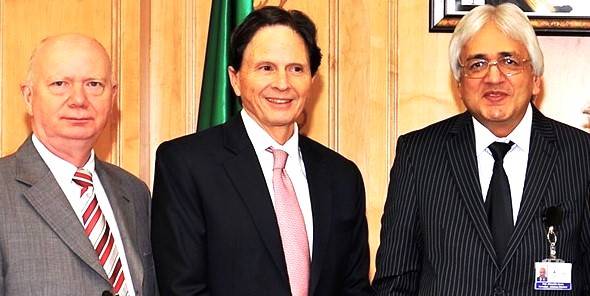"The Tokyo 2020 and Beijing 2022 Olympic Games held during the COVID-19 pandemic: planning, outcomes, and lessons learnt" was published online in the journal The Lancet on 17-Jan-2024
When the unprecedented COVID-19 pandemic first spread globally in early 2020, most of the world’s mass gatherings, religious, festival and political events were cancelled, postponed, or scaled down in size. This included postponement of the summer 2020 Olympic Games, which were scheduled for Tokyo, Japan. The decision in 2021 to hold the already postponed Tokyo Olympic Games during the height of the COVID-19 pandemic seemed rather perplexing to the global public health community since such a large mass gathering sporting event was anticipated to exacerbate global spread of the ongoing COVID-19 pandemic, with the new SARS-CoV2 Delta variant evolving and COVID-19 vaccinations were not available worldwide.
A new study published recently in The Lancet, led by our own Professor Sir Alimuddin (Ali) Zumla, together with Dr Brian McCloskey (UK Chatham House), and a team of other distinguished international public health researchers, presents data which show that careful advanced planning with a widespread testing program, prevented any significant spread of COVID-19 at The 2021 Tokyo Summer Olympic Games. Social public health measures enforced during the Games included a “closed loop” system where Games participants and the general public remained separated with movement only being allowed between pre-agreed locations via dedicated transport. Other infection control measures included compulsory mask wearing, staggered meal-times for athletes, and ensuring shared accommodation was equipped with effective ventilation systems.
Whilst thousands of people attended The Olympic Games, the rate of COVID-19 was kept extremely low at 0.02%. Also important was that people who travelled back after the Olympic Games were over did not carry COVID back to their home countries. The Olympic Games were heralded as an amazing success story and several important lessons were learnt for holding mass gathering events during epidemics. The low rate of infections was attributable not only to the carefully planned measures and testing program put in place prior to the 2021 Tokyo Games but also to the efforts of the Japan Olympic officials to minimise risk of transmission. The strategy of on-the-ground testing during the Games involved pre-departure for the Games testing, daily testing at the Games, during which each participant was tested once a day using the two diagnostic tests, and testing prior to leaving the Games. The theory was that the faster an infection is detected, the quicker one can quarantine the infected person so that they don’t go on to infect others. Since COVID-19 can spread to others before the disease can be detected by the tests, to break the cycle of spread, safety plans included testing people who had been in close contact with a person who tested positive.
Subsequently, six months after The Tokyo Olympics, Chinese officials followed these plans for organising The 2022 Beijing Winter Olympics officials with an explicit policy of “Zero Covid” against the emerging backdrop of the highly infectious Omicron variant. An effective test, trace and isolate programme coupled with high vaccination rates helped further drive down virus spread. A total of 1.9 million tests were done during the Beijing Games, with an average of 70,000 per day. The result was also the same success as the Tokyo Olympics with very low rate of COVID-19 infections.
These successes proved that, even during the height of a raging pandemic, it is possible to organize a mass gathering when appropriate medical testing and preventive plans are in place and enacted. Extensive public health actions and planning meant the Tokyo Summer Olympic Games (2021) and Beijing Winter Olympic Games (2022) did not become COVID-19 super spreader events within the Games, their host cities or across the wider world. The study also highlighted that genomic sequencing post both events showed that there was no significant spread either from participants to the host cities or from participants to their home countries when they returned.

Lead authors on The Lancet paper: Dr Brian McCloskey (Left), Prof David Heyman (Centre), Sir Prof Ali Zumla (Right)
[QUOTE FROM SIR PROF ALI ZUMLA] - Our study involved a multinational team of experts from the United Kingdom, Japan, Switzerland and the United States highlighting that preventing rapid spread of infectious diseases with epidemic potential at mass gathering events is possible. It emphasises that global co-operation, with advanced planning through multi-national pooled expertise working closely together with ‘unity of purpose’ is required to have impactful outcomes.
[QUOTE FROM CO-LEAD DR BRIAN McCLOSKEY] - It has been a pleasure to work with Sir Ali Zumla and colleagues. It is also gratifying to note that our joint legacy of expertise from the London 2012 Olympics (has placed the UK at the forefront of mass gathering planning (https://www.thelancet.com/series/mass-gatherings-medicine). Looking forward, we can say that future events, including the upcoming Olympics in Paris this summer, can be more confident that COVID-19 or other respiratory infections need not unduly disrupt the Games.
Read the full article The Tokyo 2020 and Beijing 2022 Olympic Games held during the COVID-19 pandemic: planning, outcomes, and lessons learnt in the Lancet.
 Close
Close

